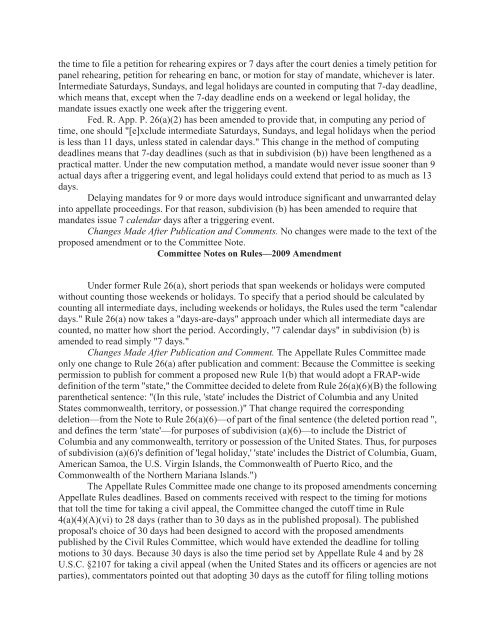Federal Rules of Appellate Procedure 2014-2015, 2014a
Federal Rules of Appellate Procedure 2014-2015, 2014a
Federal Rules of Appellate Procedure 2014-2015, 2014a
Create successful ePaper yourself
Turn your PDF publications into a flip-book with our unique Google optimized e-Paper software.
the time to file a petition for rehearing expires or 7 days after the court denies a timely petition for<br />
panel rehearing, petition for rehearing en banc, or motion for stay <strong>of</strong> mandate, whichever is later.<br />
Intermediate Saturdays, Sundays, and legal holidays are counted in computing that 7-day deadline,<br />
which means that, except when the 7-day deadline ends on a weekend or legal holiday, the<br />
mandate issues exactly one week after the triggering event.<br />
Fed. R. App. P. 26(a)(2) has been amended to provide that, in computing any period <strong>of</strong><br />
time, one should "[e]xclude intermediate Saturdays, Sundays, and legal holidays when the period<br />
is less than 11 days, unless stated in calendar days." This change in the method <strong>of</strong> computing<br />
deadlines means that 7-day deadlines (such as that in subdivision (b)) have been lengthened as a<br />
practical matter. Under the new computation method, a mandate would never issue sooner than 9<br />
actual days after a triggering event, and legal holidays could extend that period to as much as 13<br />
days.<br />
Delaying mandates for 9 or more days would introduce significant and unwarranted delay<br />
into appellate proceedings. For that reason, subdivision (b) has been amended to require that<br />
mandates issue 7 calendar days after a triggering event.<br />
Changes Made After Publication and Comments. No changes were made to the text <strong>of</strong> the<br />
proposed amendment or to the Committee Note.<br />
Committee Notes on <strong>Rules</strong>—2009 Amendment<br />
Under former Rule 26(a), short periods that span weekends or holidays were computed<br />
without counting those weekends or holidays. To specify that a period should be calculated by<br />
counting all intermediate days, including weekends or holidays, the <strong>Rules</strong> used the term "calendar<br />
days." Rule 26(a) now takes a "days-are-days" approach under which all intermediate days are<br />
counted, no matter how short the period. Accordingly, "7 calendar days" in subdivision (b) is<br />
amended to read simply "7 days."<br />
Changes Made After Publication and Comment. The <strong>Appellate</strong> <strong>Rules</strong> Committee made<br />
only one change to Rule 26(a) after publication and comment: Because the Committee is seeking<br />
permission to publish for comment a proposed new Rule 1(b) that would adopt a FRAP-wide<br />
definition <strong>of</strong> the term "state," the Committee decided to delete from Rule 26(a)(6)(B) the following<br />
parenthetical sentence: "(In this rule, 'state' includes the District <strong>of</strong> Columbia and any United<br />
States commonwealth, territory, or possession.)" That change required the corresponding<br />
deletion—from the Note to Rule 26(a)(6)—<strong>of</strong> part <strong>of</strong> the final sentence (the deleted portion read ",<br />
and defines the term 'state'—for purposes <strong>of</strong> subdivision (a)(6)—to include the District <strong>of</strong><br />
Columbia and any commonwealth, territory or possession <strong>of</strong> the United States. Thus, for purposes<br />
<strong>of</strong> subdivision (a)(6)'s definition <strong>of</strong> 'legal holiday,' 'state' includes the District <strong>of</strong> Columbia, Guam,<br />
American Samoa, the U.S. Virgin Islands, the Commonwealth <strong>of</strong> Puerto Rico, and the<br />
Commonwealth <strong>of</strong> the Northern Mariana Islands.")<br />
The <strong>Appellate</strong> <strong>Rules</strong> Committee made one change to its proposed amendments concerning<br />
<strong>Appellate</strong> <strong>Rules</strong> deadlines. Based on comments received with respect to the timing for motions<br />
that toll the time for taking a civil appeal, the Committee changed the cut<strong>of</strong>f time in Rule<br />
4(a)(4)(A)(vi) to 28 days (rather than to 30 days as in the published proposal). The published<br />
proposal's choice <strong>of</strong> 30 days had been designed to accord with the proposed amendments<br />
published by the Civil <strong>Rules</strong> Committee, which would have extended the deadline for tolling<br />
motions to 30 days. Because 30 days is also the time period set by <strong>Appellate</strong> Rule 4 and by 28<br />
U.S.C. §2107 for taking a civil appeal (when the United States and its <strong>of</strong>ficers or agencies are not<br />
parties), commentators pointed out that adopting 30 days as the cut<strong>of</strong>f for filing tolling motions


















